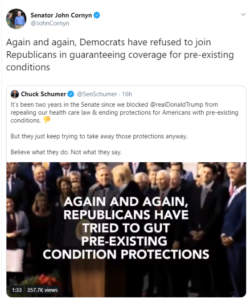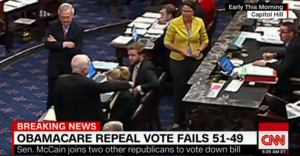Washington, DC — Today, Senate Democrats led by Senator Mark Warner (VA) held a press conference announcing the introduction of a resolution to invalidate the Trump administration’s “State Relief and Empowerment Guidance,” which allows states to push harmful junk plans and ignore protections for people with pre-existing conditions put in place by the Affordable Care Act (ACA). In response, Protect Our Care chair Leslie Dach issued the following statement:
“The contrast couldn’t be clearer: Senate Democrats are focused on saving vital protections for millions of Americans with pre-existing conditions by reversing President Trump’s harmful promotion of junk plans, while Republican Senators want to send us back to the days when insurance companies could write the rules and deny coverage or charge more for people with pre-existing conditions. A vote against this resolution shows once again that Republican Senators who claim to protect people with pre-existing conditions are not telling the truth.”
BACKGROUND
Here is what Trump’s 1332 waivers without appropriate guardrail protections could mean for consumers:
- Protections for people with pre-existing conditions would be essentially meaningless. The American Cancer Society Cancer Action Network said allowing states to waive essential health benefits “could render those protections meaningless” for people with pre-existing conditions.
- It would be harder for people with pre-existing conditions to get affordable coverage. As Consumers Union stated, allowing states to waive essential health benefits would be “putting meaningful coverage out of reach for many Americans, especially those with chronic and pre existing conditions.”
- You could pay more for the same coverage. 1332 waivers allow states to adjust the amount of premium tax credits and cost sharing consumers receive to help lower their costs. Without the guardrail to ensure coverage is just as affordable, many consumers could end up paying more for the same care. For example, Iowa and Oklahoma are pursuing waivers that change who can be eligible for tax credits and limiting how those tax credits are adjusted. In addition, Oklahoma wants to be able to charge people over 50 five times as much as younger people.
- Insurers would not have to cover essential benefits, like maternity care. Right now, every insurance plan must cover the 10 essential health benefits. Because states could opt out of covering these basic benefits, insurers would likely only offer policies that covered much less than they do now. The Kaiser Family Foundation found that the benefits most likely to no longer be covered would be maternity care, mental health or substance abuse coverage. According to the Brookings Institution, the result would be “that no one in a state’s individual market that waived EHBs would have access to comprehensive coverage. Insurers would likely sell separate policies for benefits not covered in their core plan offerings, but these supplemental policies would be subject to tremendous adverse selection, leading to very high premiums and enrollment almost exclusively by those with pre-existing conditions.” For example, a woman who purchases a separate insurance rider for maternity care would have to pay $17,320 more, according to the Center for American Progress. For states that no longer required substance use disorders or mental health to be covered, coverage for drug dependence treatment could cost an extra $20,450.
- Insurers could reimpose lifetime and annual limits. Allowing states to opt out of the essential health benefits coverage means that insurance companies could once again put lifetime and annual limits on the amount of care you receive. Moreover, as the Center on Budget and Policy Priorities notes, this would even impact people with coverage from their employer: “The ACA’s prohibition on annual and lifetime limits is tied to the definition of Essential Health Benefits. Thus, repeal of Essential Health Benefit standards could make this protection meaningless, putting almost all Americans with private health insurance coverage — not just those with individual or small-group market coverage — at risk.” The Center for American Progress estimates that 20 million people with health coverage through their employer would face lifetime limits on coverage, and 27 million would face annual limits.



